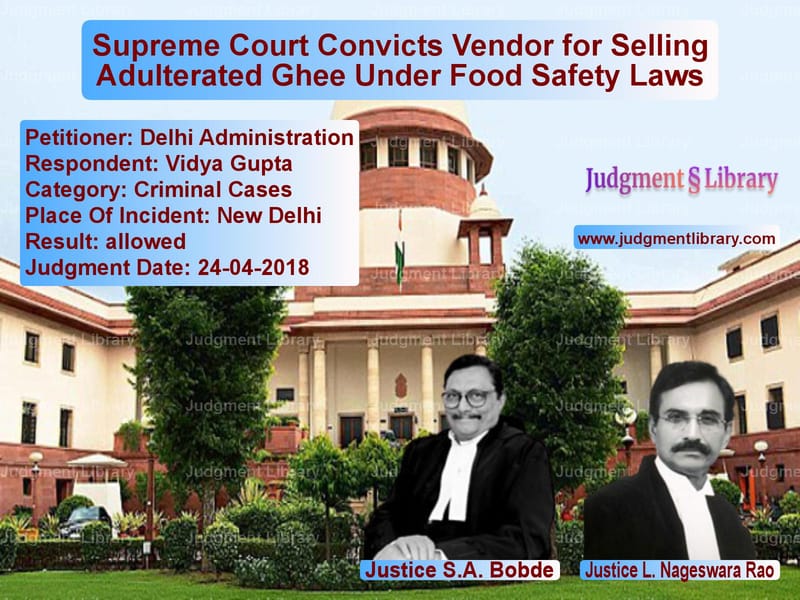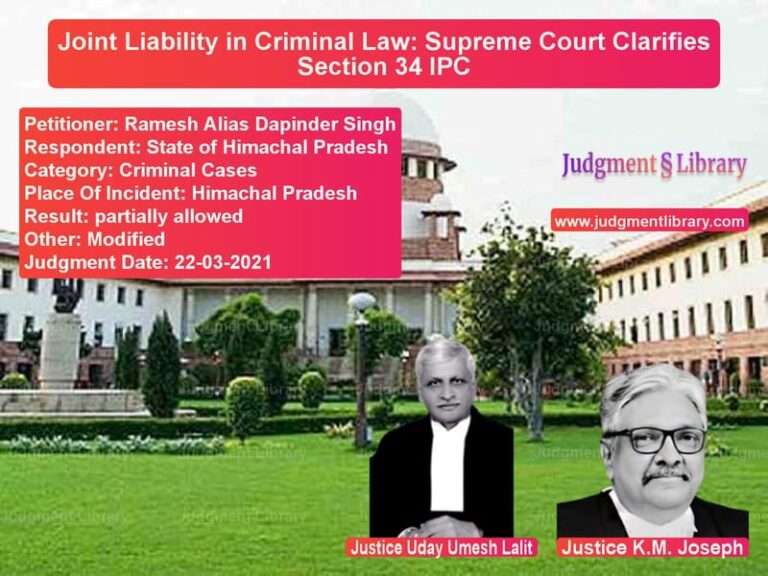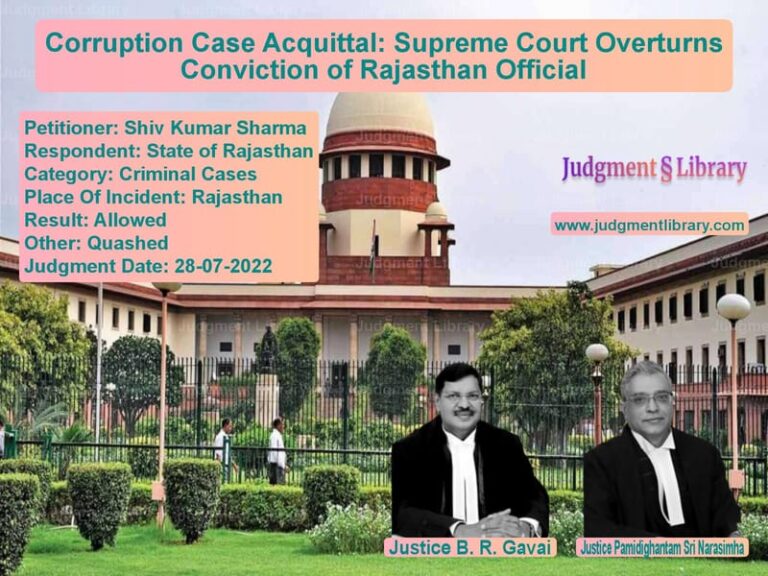Supreme Court Convicts Vendor for Selling Adulterated Ghee Under Food Safety Laws
The case of Delhi Administration v. Vidya Gupta involved a long-standing legal battle over food adulteration and the responsibilities of food vendors under the Prevention of Food Adulteration Act, 1954. The Supreme Court was called upon to determine whether the accused, a vendor, could be held liable for storing and selling adulterated ghee, even if it was intended for use in food preparation rather than direct sale.
Background of the Case
On 08.04.2004, a Food Inspector, Shri S.K. Sharma, purchased a sample of ghee from M/s New Bikaner Sweet Center, a shop run by the accused, Vidya Gupta. The sample was taken from an open tin and was tested for adulteration. The analysis revealed that:
- The Butyro Refractometer (BR) reading of the ghee exceeded the permissible limit of 43.
- The Reichert value of the sample was lower than the required 28.
- The sample tested positive for the Baudouin test, which should have been negative for pure ghee.
These findings indicated that the ghee was adulterated and did not meet the prescribed food safety standards.
Legal Proceedings
The vendor was charged under Section 2(ia)(a), (c), and (m) of the Prevention of Food Adulteration Act, 1954, punishable under Section 16(1)(a) read with Section 7 of the Act. The trial court convicted the accused, but the Sessions Court overturned the conviction and acquitted him. The Delhi Administration then approached the High Court, which declined to grant leave to appeal against the acquittal. The matter was then brought before the Supreme Court.
Arguments by the Appellant (Delhi Administration)
The prosecution argued:
- The accused stored and used adulterated ghee in the preparation of sweets, making it a clear violation of the law.
- Even if the ghee was not directly sold to consumers, storing and using it in food preparation constituted an offense under Section 7 of the Prevention of Food Adulteration Act.
- The report of the Central Food Laboratory (CFL) superseded that of the Public Analyst, making it conclusive evidence of adulteration.
Arguments by the Respondent (Vidya Gupta)
The accused countered:
- The ghee in question was not meant for direct sale but was used as an ingredient for making sweets.
- The discrepancy between the test results of the Public Analyst and the Central Food Laboratory made the prosecution’s case unreliable.
- The sample could not be considered representative due to variations in the Butyro Refractometer (BR) readings.
Supreme Court’s Judgment
The Supreme Court ruled in favor of the Delhi Administration and convicted the accused. The Court made key observations regarding food adulteration laws:
1. Storing Adulterated Food is an Offense
The Court clarified that under Section 7 of the Prevention of Food Adulteration Act, storing adulterated food—even if it is intended for use in food preparation—is an offense. The Court stated:
“If a person stores any adulterated food for the manufacture of any article of food for sale, he shall be deemed to store adulterated food. The purpose of this provision is clear—it prohibits the storing of adulterated food, even when it is meant to be used for preparing another food item for sale.”
2. Central Food Laboratory’s Report is Conclusive
The Supreme Court held that the test report from the Central Food Laboratory (CFL) takes precedence over the Public Analyst’s report. The Court cited Calcutta Municipal Corporation v. Pawan Kumar Saraf to reinforce that:
“When Section 13(3) states that the certificate of the CFL shall supersede the report, it means that the report of the Public Analyst stands annulled or obliterated.”
3. No Defense in Claiming the Food was Not Sold Directly
The Court rejected the defense that the ghee was not for direct sale, stating:
“The explanation to Section 7 does not support this contention. Whether the adulterated food is stored for sale or for preparing other food items for sale, such storing is an offense.”
Final Ruling and Sentence
The Supreme Court set aside the acquittal and convicted the accused. However, considering the time elapsed since the case began in 2004 and the accused’s age (about 70 years), the Court ruled:
“The sentence shall be confined to the period already undergone.”
Key Takeaways from the Judgment
- Food vendors cannot store adulterated food, even if it is used as an ingredient in another food product.
- The Central Food Laboratory’s report overrides the Public Analyst’s findings in cases of discrepancies.
- Even minor variations in test results do not nullify the presence of adulteration.
- Food safety laws aim to protect public health, and vendors must ensure compliance.
Conclusion
The Supreme Court’s ruling reinforces the strict stance on food adulteration and clarifies that storing adulterated food, regardless of whether it is sold directly, is a punishable offense. This judgment serves as a crucial precedent for food safety regulations, emphasizing that vendors must adhere to the highest standards of food quality and hygiene.
Petitioner Name: Delhi Administration.Respondent Name: Vidya Gupta.Judgment By: Justice S.A. Bobde, Justice L. Nageswara Rao.Place Of Incident: New Delhi.Judgment Date: 24-04-2018.
Don’t miss out on the full details! Download the complete judgment in PDF format below and gain valuable insights instantly!
Download Judgment: Delhi Administration vs Vidya Gupta Supreme Court of India Judgment Dated 24-04-2018.pdf
Direct Downlaod Judgment: Direct downlaod this Judgment
See all petitions in Consumer Rights
See all petitions in Legal Malpractice
See all petitions in Public Interest Litigation
See all petitions in Judgment by S. A. Bobde
See all petitions in Judgment by L. Nageswara Rao
See all petitions in allowed
See all petitions in supreme court of India judgments April 2018
See all petitions in 2018 judgments
See all posts in Criminal Cases Category
See all allowed petitions in Criminal Cases Category
See all Dismissed petitions in Criminal Cases Category
See all partially allowed petitions in Criminal Cases Category







